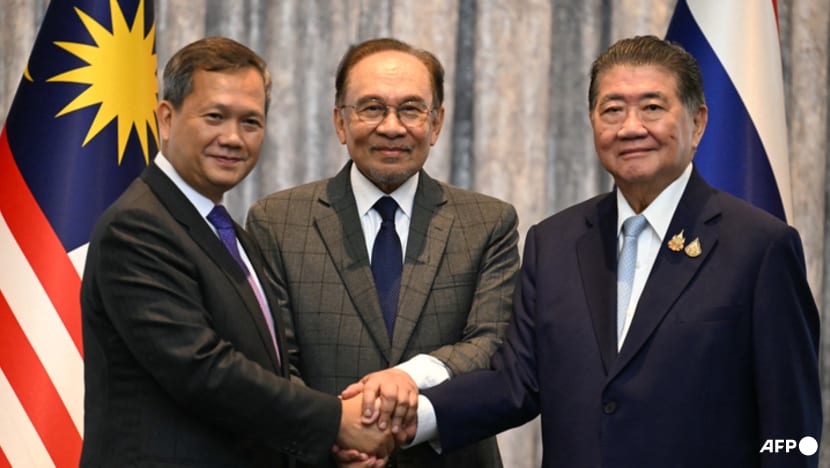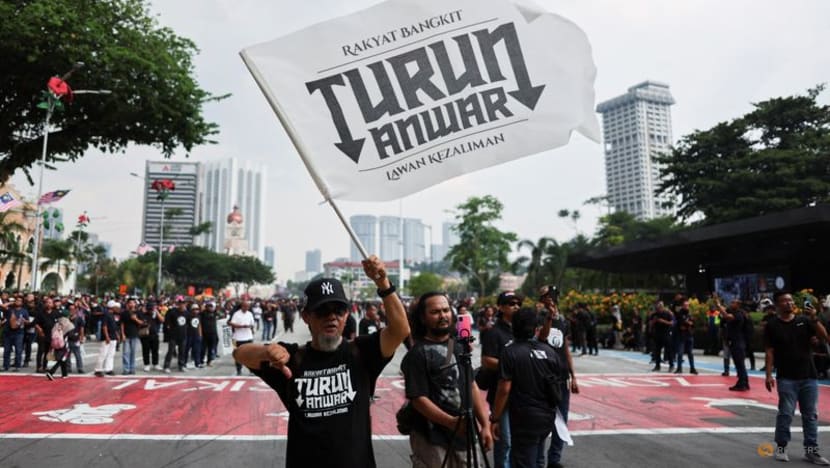Commentary: Anwar holds his ground by seizing eleventh-hour deals
Malaysian Prime Minister Anwar Ibrahim faced calls to step down in July, but mediating the Cambodia-Thailand conflict was his trump card, says political analyst James Chai.


This audio is generated by an AI tool.
KUALA LUMPUR: In politics, as in opera, nothing is over till the fat lady sings. Perhaps no one knows this better than seasoned politician and Malaysia’s Prime Minister Anwar Ibrahim.
The Anwar administration has been under both internal and external pressure. Controversy surrounded the government’s failure to fill vacancies in the country’s highest courts, triggering allegations last month that Mr Anwar was interfering with the judiciary.
Hundreds of lawyers thronged the streets of Putrajaya in protest, walking under the midday sun to hand over a memorandum calling for action, transparency and a Royal Commission of Inquiry.
On Jul 1, Malaysia expanded its sales and services tax (SST) to more categories of goods and services. Though selective, the changes created public uproar and ammunition for the opposition to use against Mr Anwar’s administration.
Also in early July, the US raised Malaysia's tariff rate by 1 percentage point to 25 per cent, even after Putrajaya’s efforts to negotiate with Washington.
Sensing an opening, 100-year-old former prime minister Mahathir Mohamad went for the jugular, calling for Mr Anwar to step down. The opposition coalition, Perikatan Nasional, capitalised on this wave of dissatisfaction by organising the “Turun Anwar” (Step Down Anwar) rally on Jul 26.

Meanwhile, long-simmering tensions between Cambodia and Thailand escalated when the two countries exchanged fire, putting Malaysia’s ASEAN chairmanship to the test. Murphy’s Law ran in full: Anything that can go wrong, will go wrong.
But the story did not fully play out until the eleventh hour.
ANWAR’S TRUMP CARD
The appointments of neutral candidates to the top judicial posts, including former deputy minister Wan Ahmad Farid Wan Salleh, did enough to quell dissent, though questions on judicial independence remained.
On the economic front, the Anwar administration rolled out measures to support citizens, such as a one-off RM100 (US$24) cash handout to all adult Malaysians and an additional public holiday.
While the reactions to these measures were at best mixed, the lukewarm Turun Anwar rally ended up making Mr Anwar look better. Turnout was significantly lower than what a few opposition lawmakers predicted, and it was concentrated among the opposition’s Malay supporters. Without broad-based support, a protest might prove counterproductive to the organisers.
The trump card for Mr Anwar, however, was his role in mediating the Cambodia-Thailand conflict. The prime ministers of the two countries convened in Malaysia and signed an unconditional ceasefire agreement, after five days of fighting.
Isolated skirmishes continued the next day, with both countries accusing the other of flagrant violations. But regional military commanders came together to maintain the ceasefire deal. Defence attaches agreed to meet in Malaysia, and direct communication lines were established in August. Displaced civilians began returning home. In the end, the ceasefire held.
THE IMPORTANCE OF ELEVENTH-HOUR DEALS
As ASEAN’s two largest trade partners, the US and China are undeniably important in keeping the peace in Southeast Asia. But Mr Anwar’s role was essential as ASEAN chair for 2025, and his diplomatic success commands confidence and credibility for the region.
On Aug 1, the US announced that it will decrease Malaysia’s tariff rate from 25 per cent to 19 per cent. The 19 per cent rate does not give Malaysia a comparative advantage over other Southeast Asian countries, but with an equal rate imposed on Cambodia, Thailand, the Philippines, and Indonesia, it gives ASEAN reason to unite and cooperate on trade.
The Trump-Anwar phone call on Jul 31 seemed to indicate that the ceasefire deal had a positive effect – President Donald Trump even committed to attending the ASEAN summit in October.
It remains uncertain if foreign policy has much effect on domestic politics in ASEAN – it rarely has in the past. But we live in different times. Geopolitics, tariffs and armed conflicts are becoming the norm.
In times like these, these eleventh-hour deals are important – and Mr Anwar will be looking to seize every opportunity.
James Chai is a political analyst, columnist and the author of Sang Kancil (Penguin Random House). He writes a monthly column for CNA, published every second Friday.
















